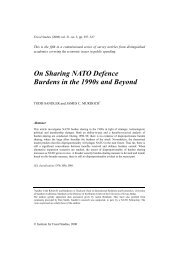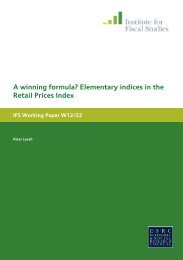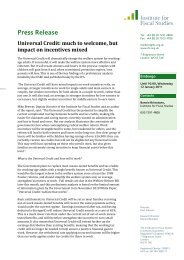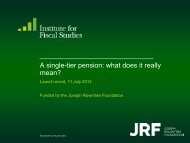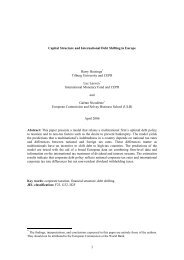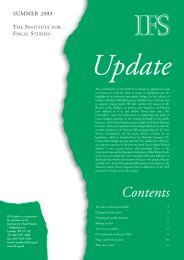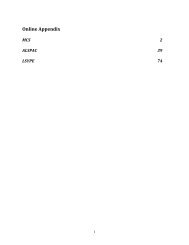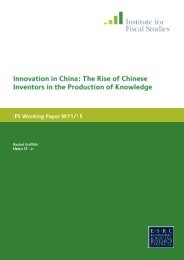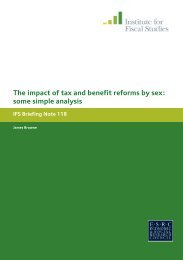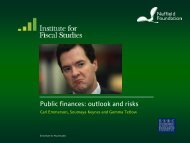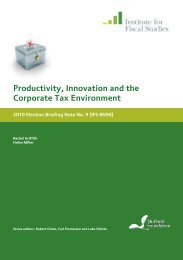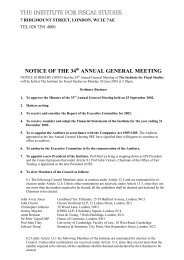A single-tier pension: what does it really mean? - The Institute For ...
A single-tier pension: what does it really mean? - The Institute For ...
A single-tier pension: what does it really mean? - The Institute For ...
Create successful ePaper yourself
Turn your PDF publications into a flip-book with our unique Google optimized e-Paper software.
Proposed reforms<br />
Box 3.1. Examples of future state <strong>pension</strong> accrual under the <strong>single</strong>-<strong>tier</strong><br />
system<br />
<strong>The</strong> following examples describe hypothetical individuals in the year 2016. All<br />
monetary figures are expressed in 2013–14 earnings terms.<br />
Lucinda is 35 years old, is employed and earns £900 a week. She regularly saves<br />
money into a personal <strong>pension</strong> and also receives a <strong>pension</strong> contribution from her<br />
employer. Under the <strong>single</strong>-<strong>tier</strong> system, in return for paying National Insurance<br />
contributions on her earnings for a year, Lucinda will accrue extra state <strong>pension</strong><br />
income worth £4.20 per week, which she will receive from the age of 68.<br />
Jacob is 29 years old, is employed and earns £115 per week. He <strong>does</strong> not save in<br />
a private <strong>pension</strong>. In return for paying NI contributions on his earnings for a<br />
year, Jacob will accrue extra state <strong>pension</strong> income worth £4.20 per week, which<br />
he will receive from the age of 68.<br />
Yousef is 58 years old and spends 35 hours a week caring for his mother.<br />
Between the ages of 20 and 55, he was self-employed and paid class 2 NI<br />
contributions; he will therefore already have accrued a full 35 years of<br />
ent<strong>it</strong>lement to the <strong>single</strong>-<strong>tier</strong> <strong>pension</strong>. Yousef’s caring responsibil<strong>it</strong>ies will<br />
therefore accrue him no extra state <strong>pension</strong> income.<br />
<strong>The</strong> Wh<strong>it</strong>e Paper suggested that the level of the <strong>single</strong>-<strong>tier</strong> <strong>pension</strong> should be<br />
increased at least in line w<strong>it</strong>h growth in average earnings. <strong>The</strong> BSP is bound in<br />
legislation to increase each year at least in line w<strong>it</strong>h average earnings growth,<br />
though this government has comm<strong>it</strong>ted to triple lock <strong>it</strong> (increase by the greatest<br />
of CPI inflation, average earnings growth and 2.5%) until the end of this<br />
parliament.<br />
In <strong>it</strong>s Impact Assessment of the reform, 28 DWP assumed that the <strong>single</strong>-<strong>tier</strong><br />
<strong>pension</strong> would be increased indefin<strong>it</strong>ely in line w<strong>it</strong>h the triple lock. Throughout<br />
this report, we have chosen to illustrate the impact of the <strong>single</strong>-<strong>tier</strong> <strong>pension</strong><br />
policy assuming that both the BSP and the <strong>single</strong>-<strong>tier</strong> <strong>pension</strong> are uprated beyond<br />
the end of the current parliament by average earnings growth rather than a triple<br />
lock. This is both because <strong>it</strong> makes description of the policies clearer and because<br />
<strong>it</strong> <strong>does</strong> not seem plausible or desirable to keep in place a policy that, in the very<br />
long run, implies state <strong>pension</strong> ent<strong>it</strong>lements becoming larger and larger relative<br />
to average earnings. 29<br />
28 Department for Work and Pensions, 2013b.<br />
29 In producing long-term forecasts for the public finances, the Office for Budget Responsibil<strong>it</strong>y<br />
assumes that the triple lock implies an average 0.26 percentage point per year increase in the BSP<br />
above average earnings growth, an assumption that was adopted by DWP when producing <strong>it</strong>s<br />
Impact Assessment of the recent Wh<strong>it</strong>e Paper reforms. This ratchet implies that state <strong>pension</strong><br />
ent<strong>it</strong>lements will become larger and larger each year relative to average earnings.<br />
17



